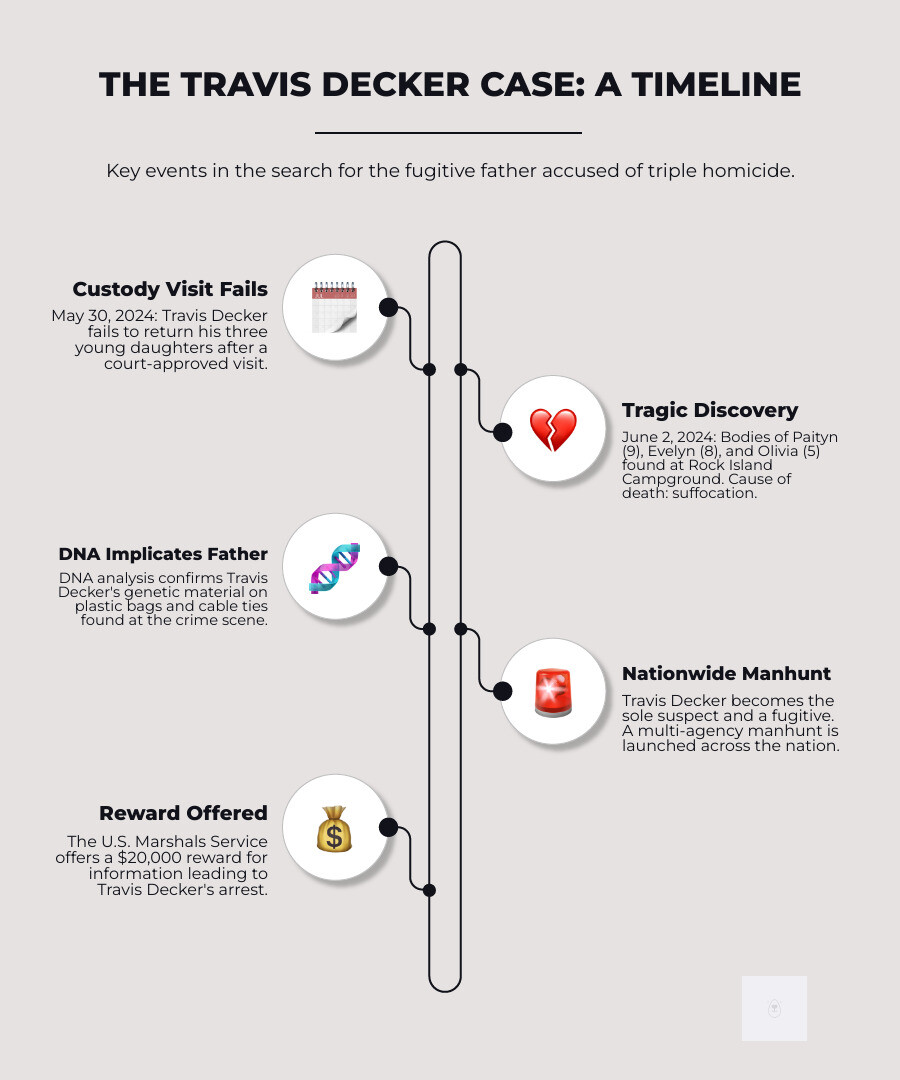
A Father Accused: The Shocking Case That Shook a Nation
Travis Decker is a 32-year-old former Army veteran from Washington state who is wanted for the alleged murder of his three young daughters in June 2024. He remains at large despite a nationwide manhunt, with authorities offering a $20,000 reward for information leading to his arrest.

Key Facts About Travis Decker:
- Age: 32 years old (born August 15, 1992)
- Physical Description: 5’8″, 190 lbs, black hair, brown eyes
- Charges: Three counts of first-degree murder and first-degree kidnapping
- Victims: His daughters Paityn (9), Evelyn (8), and Olivia (5)
- Status: Fugitive since June 2024; considered armed and dangerous
- Evidence: DNA found on plastic bags and cable ties at crime scene
- Reward: $20,000 offered by U.S. Marshals Service
The case began when Decker failed to return his daughters after a court-approved visit on May 30, 2024. Their bodies were found three days later at Rock Island Campground in Chelan County, Washington, with autopsies revealing they died from suffocation.
DNA analysis confirmed Decker as the sole suspect, with his genetic material found on plastic bags placed over the children’s heads and on cable ties found near their bodies. Despite extensive search efforts involving multiple law enforcement agencies, his whereabouts remain unknown.
This tragic case has captured national attention, highlighting the devastating consequences of domestic violence and failed family systems. As someone who has covered high-profile cases and societal tragedies throughout my career in media and public relations, I’ve witnessed how such shocking events ripple through communities from Washington to New York City. The Travis Decker manhunt represents one of the most disturbing family murder cases in recent memory, leaving a nation searching for answers and justice.

Travis decker helpful reading:
The Tragic Find: What Happened to Paityn, Evelyn, and Olivia?
What began as a routine father-daughter visit on May 30 quickly transformed into every parent’s worst nightmare. Nine-year-old Paityn Decker, eight-year-old Evelyn Decker, and five-year-old Olivia Decker were excited to spend time with their father during what should have been a normal custody visit. As someone who has covered family tragedies from New York City to small towns across America, I’ve seen how these stories unfold – and they always start so innocently.
The three sisters were last seen that Thursday evening at Rock Island Campground in Chelan County, Washington. When Travis Decker failed to return them to their mother Whitney as scheduled, concern quickly turned to panic. In cases like these, every hour that passes feels like an eternity for the families involved.
Three agonizing days later, on June 2, searchers made the devastating finding that would shake the nation. The bodies of all three Decker sisters were found at the same campground where they’d last been seen alive. The scene was beyond heartbreaking – these weren’t just statistics, but three young lives cut tragically short.
The forensic evidence painted a horrifying picture of their final moments. Autopsies confirmed that all three girls died from suffocation. The crime scene revealed disturbing details that would become crucial to the investigation: plastic bags had been placed over each child’s head, with some victims having multiple bags. Cable ties were found scattered near their bodies, creating a chilling portrait of premeditation.
For those seeking more details about the initial investigation, you can review a news release on the crime scene. The methodical nature of the evidence suggested this wasn’t a crime of passion, but something far more calculated and disturbing.
The abandoned truck nearby told its own story – Travis Decker had vanished, leaving behind only questions and unimaginable grief. From the busy streets of New York City to quiet communities across Washington state, people struggled to comprehend how a father could allegedly commit such an unthinkable act against his own children.
These weren’t just names in a news report. Paityn, Evelyn, and Olivia were real little girls with dreams, favorite toys, and bright futures ahead of them. Their tragic end would spark a nationwide manhunt and leave a community forever changed.
The Investigation: How DNA Evidence Implicated the Father
When tragedy strikes this close to home, the search for answers becomes deeply personal. As someone who has followed countless high-profile cases from New York City to the Pacific Northwest, I’ve seen how forensic science can either make or break a case. In the Travis Decker investigation, DNA evidence would prove to be the smoking gun that investigators desperately needed.
The DNA Evidence Against Travis Decker
The breakthrough came on August 6, just two months after those three precious lives were lost. The Washington State Crime Lab delivered results that would forever change the trajectory of this case. Their findings were as clear as they were devastating.
Travis Decker’s DNA was found directly on the plastic bags that had been placed over his daughters’ heads. Think about that for a moment – the very instruments used to end their lives bore his genetic fingerprint. But the evidence didn’t stop there. His DNA also appeared on the cable ties found near the girls’ bodies at the crime scene.
What made this evidence even more compelling was what investigators didn’t find. While the victims’ DNA was understandably present on the bags, no other unknown DNA profiles were detected on these critical pieces of evidence. This absence of additional suspects led authorities to a chilling conclusion: Travis Decker was their sole suspect.
The final piece of this forensic puzzle came from Travis Decker’s own vehicle. Bloody handprints found on the tailgate matched his DNA profile perfectly, creating an undeniable link between him and the crime scene. For investigators, this wasn’t just evidence – it was a roadmap that led directly to a father accused of the unthinkable.
The Official Charges
Armed with this overwhelming DNA evidence, law enforcement moved swiftly to formalize their case. The charges against Travis Decker reflect the full weight of what authorities believe he did to his own children.
Three counts of first-degree murder – one for each daughter: nine-year-old Paityn, eight-year-old Evelyn, and five-year-old Olivia. Additionally, he faces one count of first-degree kidnapping, acknowledging that he took these children from their normal lives before allegedly ending them.

The moment that arrest warrant was issued, everything changed. Travis Decker transformed from a person of interest into a wanted fugitive. The legal system had spoken, and now the real hunt could begin.
From my years covering similar cases, I know that DNA evidence like this rarely lies. It’s the kind of scientific certainty that prosecutors dream of and defense attorneys fear. In this case, it painted a picture so clear that even the most skeptical observer would struggle to find reasonable doubt.
The Nationwide Manhunt for Travis Decker
When authorities issued that arrest warrant for Travis Decker, something shifted. What had been a heartbreaking search for missing children suddenly became one of the most intensive fugitive hunts in recent memory. The quiet campgrounds of Washington state were about to become the center of a manhunt that would capture attention from coast to coast—including here in New York City, where we’ve watched similar cases unfold with both fascination and horror.
The Search for Travis Decker
The hunt for Travis Decker reads like something out of a thriller, except the stakes are devastatingly real. The Chelan County Sheriff’s Office didn’t waste any time calling in the big guns. Within hours, the U.S. Marshals Service had joined the effort, bringing their specialized fugitive-tracking expertise to what was quickly becoming an extraordinary challenge.
Picture this: you’re trying to find one man in some of the most unforgiving wilderness America has to offer. The area around Rock Island Campground isn’t exactly Central Park. We’re talking about dense forests that stretch for miles, rocky terrain that would challenge even experienced hikers, and weather that can turn deadly without warning.
But here’s what makes this search even more complicated: Travis Decker isn’t your average fugitive. As an Army veteran, he came equipped with serious wilderness survival skills. While most of us city folks would struggle to last a weekend camping, this man had military training that could help him disappear into the wilderness indefinitely.
The search effort itself was impressive. We’re talking about a multi-agency effort that included everything from search dogs to helicopters. Teams combed through miles of rough terrain, following every possible lead and checking every conceivable hiding spot.
Months passed. The initial intensity of the search, with its round-the-clock operations and massive resource deployment, eventually had to be scaled back. It’s a harsh reality of these cases—you can’t maintain that level of intensity forever, especially when leads start drying up.
The most haunting part? Authorities still don’t know if Travis Decker is alive or deceased. That uncertainty hangs over everything, leaving investigators, the community, and the nation without closure.
Public Involvement and the Reward
Here’s where the story gets personal for all of us. Law enforcement knows they can’t do this alone. They need eyes and ears everywhere—from the coffee shops in small Washington towns to the busy streets of New York City. You never know where a fugitive might surface.
The stakes are high enough that there’s a $20,000 reward on the table. That’s serious money, and it reflects just how desperately authorities want to bring Travis Decker to justice. Public tips have become absolutely crucial to keeping this case alive.
But let’s be crystal clear about something: if you think you’ve spotted him, don’t play hero. Travis Decker is considered armed and dangerous. The same military training that might help him survive in the wilderness could make him extremely dangerous if cornered. Call 911 immediately—don’t try to approach or apprehend him yourself.
If you have information that might help, there are proper channels to get it to the right people. You can Submit information via USMS Tips, where trained professionals will evaluate every lead that comes in.
Cases like this remind us how interconnected our world really is. A crime that happens in rural Washington can have implications that reach all the way to major cities like New York. At R. Couri Hay Columns, we’ve seen how strategic communication and public awareness can be game-changers in high-profile cases. For more insights into how publicity efforts can support justice, you can explore More on our publicity services.
Every tip matters. Every pair of eyes watching could be the ones that finally bring Travis Decker to justice and give those three little girls the accountability they deserve.
A Family’s Nightmare and a Nation’s Grief
Behind every headline and manhunt lies a profound human story that touches hearts from Washington state to New York City. The Travis Decker case represents more than just a criminal investigation—it’s a devastating family tragedy that has left a mother without her children and a nation struggling with uncomfortable questions about domestic violence and mental health.
A Mother’s Heartbreak
Whitney Decker’s world shattered the moment she realized her daughters weren’t coming home. As a mother myself, I can barely imagine the depth of her pain as she shared beautiful memories of Paityn, Evelyn, and Olivia—three little girls who came “into the world with open hearts and kindness.”
Whitney’s tributes to her daughters paint a picture of vibrant, loving children with distinct personalities. Nine-year-old Paityn was the family storyteller, eagerly sharing every detail of her day with her mom. Eight-year-old Evelyn treasured those quiet bedtime conversations where she could open up about her feelings. And little Olivia, just five years old, consistently reported being “happy” when her mother asked about her emotions—a simple daily ritual that now carries heartbreaking weight.
The custody arrangement between Whitney and Travis Decker followed a court-ordered parenting plan, designed to ensure both parents remained involved in the girls’ lives. On that fateful day in May, Whitney noticed something different about Travis Decker’s demeanor—he seemed “quieter than usual.” It’s a detail that haunts her now, a subtle warning sign that no parent should ever have to recognize.
A Troubled Past and a Community’s Response
The investigation revealed that Travis Decker had a documented history of mental health challenges. Court records show he was previously ordered to attend both anger management and counseling sessions, indicating that warning signs existed long before this tragedy unfolded.
These details raise difficult questions about our support systems and whether they’re adequate to prevent such devastating outcomes. Here in New York City, we’re familiar with the complexities of mental health resources and the gaps that can exist even in well-funded systems.
The murders of the Decker sisters sent national shockwaves through communities everywhere. From small Washington towns to busy cities like New York, people gathered at vigils and began difficult conversations about domestic violence and protecting vulnerable children.
This case has sparked renewed domestic tragedy awareness in communities across the country. Parents are having harder conversations with their children about safety, and communities are examining whether their intervention systems are strong enough to prevent similar tragedies.
As someone who covers society and culture from New York City, I’ve seen how these stories resonate far beyond their immediate location. The pain of losing three innocent children transcends geography—it reminds us that behind every news story are real families facing unimaginable loss.
Frequently Asked Questions about the Travis Decker Case
The Travis Decker case has captured nationwide attention, and understandably so. From our newsrooms here in New York City to living rooms across America, people are asking the same troubling questions about this heartbreaking tragedy. As someone who has spent years covering complex stories that shake communities to their core, I know how important it is to have clear, accurate answers during such difficult times.
Let me walk you through the most pressing questions that have emerged about this case, drawing from official law enforcement sources and court documents.
What are the specific charges against Travis Decker?
Travis Decker faces some of the most serious charges in our legal system. He’s wanted on three counts of first-degree murder – one for each of his precious daughters: Paityn, Evelyn, and Olivia. Additionally, he faces one count of first-degree kidnapping.
These aren’t charges that authorities take lightly. The first-degree murder counts reflect what prosecutors believe was a deliberate, premeditated act. The kidnapping charge stems from the period when he failed to return the girls after their court-approved visit on May 30 until their tragic finding three days later.
The DNA evidence linking him to the plastic bags and cable ties found at the scene provided the foundation for these charges. It’s the kind of forensic evidence that transforms a missing persons case into something far more sinister.
Is there still a reward for information leading to his arrest?
Yes, and it’s substantial. The U.S. Marshals Service continues to offer up to $20,000 for information that directly leads to Travis Decker’s arrest. This reward remains active and represents the ongoing commitment to bringing him to justice.
What strikes me about this reward is how it reflects the community’s determination to find answers. From Washington state to here in New York, people understand that sometimes a single tip can break a case wide open. Authorities emphasize that no detail is too small – what might seem insignificant to you could be the missing piece investigators need.
However, there’s a critical warning that comes with this reward. Travis Decker is considered armed and dangerous. If anyone spots him, they should immediately call 911 rather than approach him. The safety of the public remains paramount, even as the search for justice continues.
What was the custody arrangement for the children before their deaths?
The custody situation was governed by what’s called a court-ordered parenting plan. This is a legal document that spells out exactly when, where, and how parental visits should happen. It’s designed to protect everyone involved, especially the children.
On May 30, Travis Decker picked up Paityn, Evelyn, and Olivia for what should have been a routine, court-approved visit. Whitney Decker, their mother, had every reason to expect her daughters would be returned safely and on time, just as the legal agreement required.
When he failed to bring them back as scheduled, it wasn’t just a worried mother’s concern – it was a legal violation that triggered immediate alarm bells. Whitney’s decision to contact authorities when the girls didn’t come home was the right call, though tragically, it came too late to save her daughters.
This formal custody arrangement shows that there were legal safeguards in place. Yet it also highlights how even official oversight can’t always prevent the unthinkable from happening within families.
Conclusion: An Unresolved Case and a Call for Justice
The Travis Decker case continues to haunt us months after those three precious lives were lost. As someone who has covered countless stories from the busy streets of New York City to quiet communities across America, I can tell you that some cases stick with you. This is one of them.
The search for Travis Decker isn’t over, not by a long shot. While the massive ground searches through Washington’s rugged wilderness have been scaled back, the U.S. Marshals Service and other agencies remain vigilant. Every day that passes without answers feels like another day that justice is delayed for Paityn, Evelyn, and Olivia.
What haunts me most is the uncertainty. Is Travis Decker still alive, hiding somewhere in the vast American landscape? Did he perish in those unforgiving mountains where his daughters were found? The not knowing adds another layer of anguish for Whitney Decker and everyone who loved those little girls.
These weren’t just statistics or case numbers. These were children with bright futures ahead of them – Paityn with her storytelling, Evelyn with her thoughtful bedtime conversations, and little Olivia with her infectious happiness. Their community deserves answers. Their mother deserves justice.
The ripple effects of this tragedy have reached far beyond Washington state. Here in New York City, we’ve seen how cases like this spark important conversations about domestic violence prevention and mental health support systems. Communities everywhere are asking the hard questions: How do we spot the warning signs? How do we better protect our most vulnerable?
At R. Couri Hay Columns, we’ve long understood that high-profile cases like this require careful, thoughtful coverage. The intersection of public interest, family tragedy, and ongoing investigations creates complex challenges for everyone involved. For those facing similar crisis situations in the public eye, we offer guidance through our crisis management services.
The $20,000 reward remains active. Someone, somewhere, knows something that could bring Travis Decker to justice. Until that day comes, this case stands as a stark reminder that even in our interconnected world, some people can simply vanish – taking with them the answers that grieving families desperately need.
Justice delayed is not justice denied, but it certainly feels that way for those left behind.



